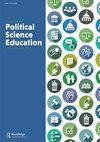#破米者:通过分享经验促进课堂上的跨文化对话
IF 0.6
Q3 POLITICAL SCIENCE
引用次数: 1
摘要
摘要研究表明,课堂动态得益于相互尊重的文化,尤其是在以学生讨论和课堂参与为基础的研讨会课程中。但培养这样的文化可能具有挑战性,尤其是因为学生来自不同的文化背景,并将不同的生活体验带到课堂空间。本文概述了本学期第一次会议期间开展的一项活动,该活动通过鼓励学生提供他们对共同经历的看法,促进课堂上的跨文化对话。该活动要求学生回答一个简单的问题:“你的家庭或你的文化是如何做饭的?”通过以全球各地的一种简单食材为例,该活动展示了学生如何根据自己的经历对同一主题持有不同的观点,以及当对给定主题的看法可能不同时,课堂如何在整个学期进行对话的模型。这项活动提供了一个例子,说明如何以促进对话、促进参与和树立智力尊重的方式使用课堂破冰工具。本文章由计算机程序翻译,如有差异,请以英文原文为准。
The #RiceBreaker: Facilitating Intercultural Dialogues in the Classroom by Engaging Shared Experiences
Abstract Research demonstrates that classroom dynamics benefit from a culture of mutuality and respect, especially in seminar courses that thrive on student discussion and classroom participation. But cultivating such a culture can be challenging, especially because students come from various cultural backgrounds and bring different life experiences with them to the classroom space. This article outlines an activity employed during the first meeting of the semester that facilitates intercultural dialogue in the classroom by encouraging students to provide their perspectives on a shared experience. The activity asks students to answer a straightforward question: “how does your family or your culture cook rice?” By using the example of a simple ingredient found across the globe, the activity demonstrates how students can hold different perspectives on the same topic based on their own experiences, and models for the class how to approach conversation throughout the semester when perspectives on a given topic may vary. This activity provides an example of how a classroom icebreaker can be used in a way that facilitates dialogue, promotes participation, and models intellectual respect.
求助全文
通过发布文献求助,成功后即可免费获取论文全文。
去求助
来源期刊

Journal of Political Science Education
POLITICAL SCIENCE-
CiteScore
1.80
自引率
36.40%
发文量
69
期刊介绍:
The Journal of Political Science Education is an intellectually rigorous, path-breaking, agenda-setting journal that publishes the highest quality scholarship on teaching and pedagogical issues in political science. The journal aims to represent the full range of questions, issues and approaches regarding political science education, including teaching-related issues, methods and techniques, learning/teaching activities and devices, educational assessment in political science, graduate education, and curriculum development. In particular, the journal''s Editors welcome studies that reflect the scholarship of teaching and learning, or works that would be informative and/or of practical use to the readers of the Journal of Political Science Education , and address topics in an empirical way, making use of the techniques that political scientists use in their own substantive research.
 求助内容:
求助内容: 应助结果提醒方式:
应助结果提醒方式:


